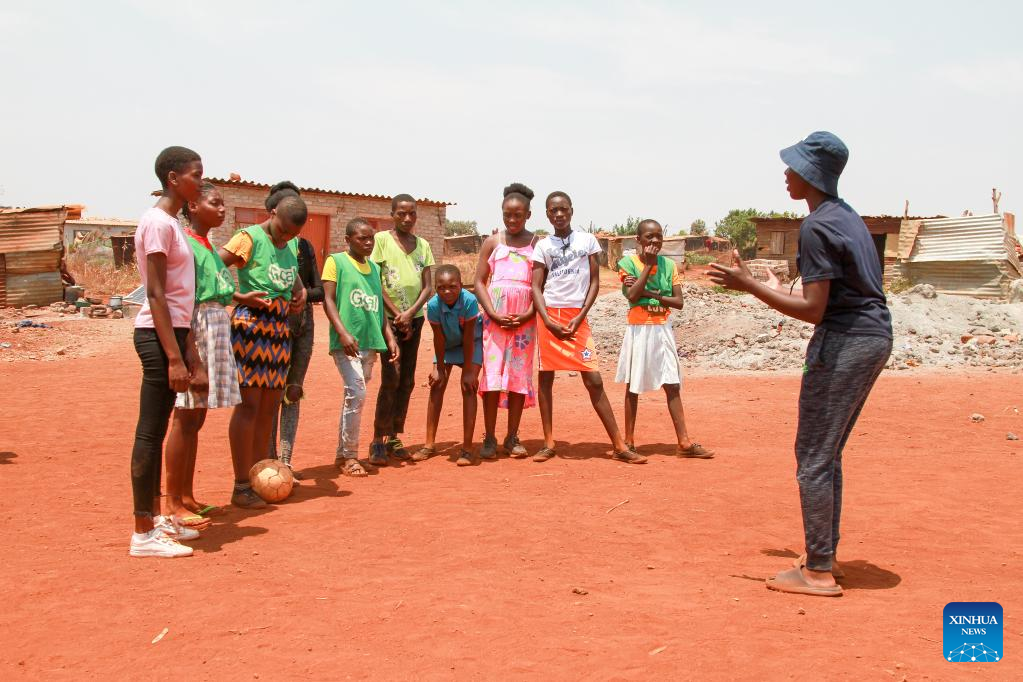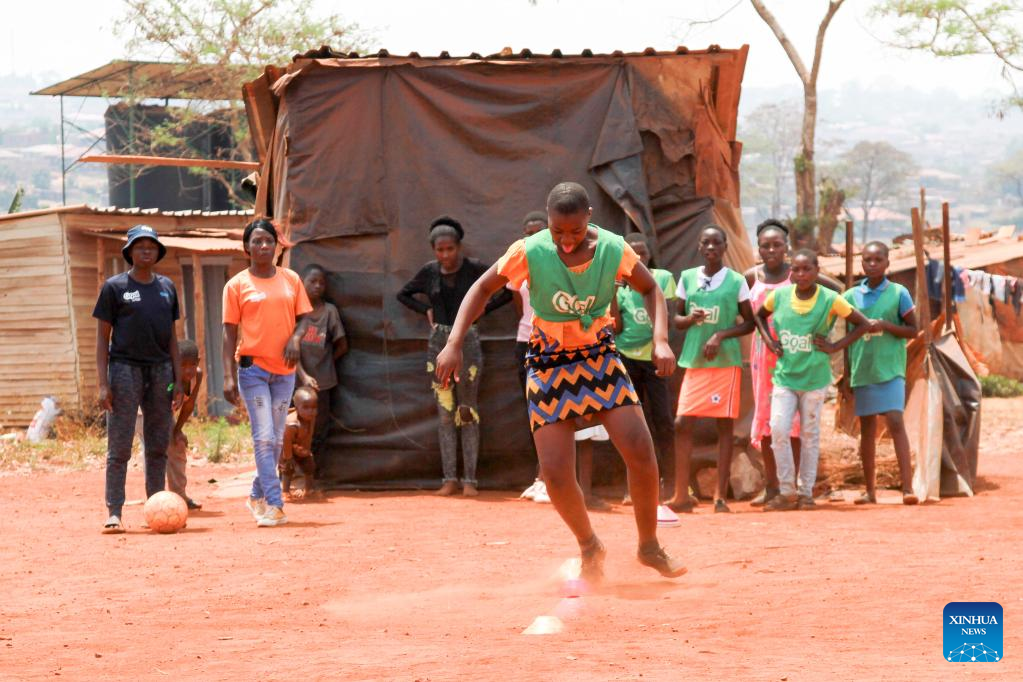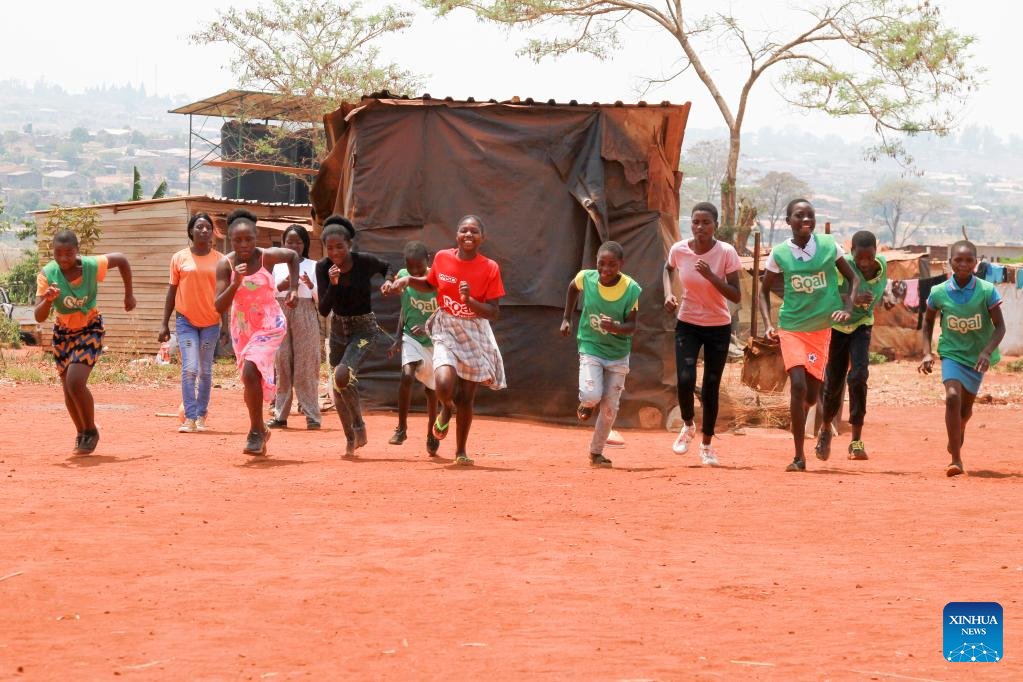
Coach Mercy Humbira (1st R) speaks with her players after a practice match in Hatcliffe, Zimbabwe on Oct. 1, 2022. (Photo by Tafara Mugwara/Xinhua)
HARARE, Oct. 4 (Xinhua) -- From the dusty playgrounds of Hatcliffe Extension, a low income settlement on the outskirts of the capital Harare, ten girls from disadvantaged backgrounds will hoist Zimbabwe's flag at the Street Child World Cup to be held in Qatar from October 8 to 15.
Rising above gender stereotypes and a sea of poverty, the girls, some of whom have had rough starts in life living in informal settlements, will make their mark at the prestigious tournament which includes 28 teams from 24 countries and regions.
The Street Child World Cup brings street-connected young people from across the world together to take part in a football tournament and a festival of arts, among other programs.
As the day for departure approached, Amy Karasa was all smiles.
"I feel very happy to represent Zimbabwe in Qatar because not many people get the opportunity. This is an opportunity of a lifetime, it could change my whole life," Karasa told Xinhua.
For Ruth Chantel James, representing her country at a global event was a dream come true.
"My dream was that one day I would fly out of the country, go somewhere else, represent Zimbabwe, represent the girls in Zimbabwe and also uplift our vulnerable community and set an example for the others," she said.
"I feel like I will be an example to the community. I will represent all the girls in this community, and I can show them that there is nothing they can't do, they can achieve what they want," she added.
Gamuchirai Tsabora expects her participation at the event to be a game-changer.
"I am feeling very happy. Playing football has uplifted me. I am the first person in my family to fly, so I am overflowing with happiness. I want to say that sport is a good thing because it has uplifted me. I never thought that I would go abroad, but I have achieved it through football," she said.
Her mother, Pamela Zivare, could not contain her excitement either.
"I am very happy with what this child has done. I am expecting that with what she has achieved, she is the one who will uplift even the whole family so that our lives can be better, so I am very happy with what Gamuchirai has done for me," said Zivare.
Pearl Gambiza, Programs Manager for Young Achievement Sports for Development (YASD), an organization that encourages the use of sports in creating safe spaces for young girls and the custodian of the Street Child World Cup in Zimbabwe, said the platform is meant to uplift the lives of vulnerable children.
"For the girls, some are looking into professional football, some are looking into coaching, so for them this is the platform that they are going to use to catapult themselves into different career paths, into their different paths in terms of sport," said Gambiza.
Coach Mercy Humbira is confident her team will emerge victorious.
"As Hatcliffe residents, a place that is looked down upon because we live in makeshift houses, I am very happy that those people who are looked down upon have reached great heights to represent Zimbabwe, and I am confident that we are going to win because we worked very hard," she said.
Humbira said football is opening countless doors for the children.
"Football is uplifting the girls because many people in this neighborhood are not going to school. Their parents are not formally employed, they don't have stable income streams, so when we play, our talent is exposed to those out of the country," she said.
"As girls in this community we face a lot of challenges. Sometimes when we come to play football, we leave a lot at home and then we come to refresh our minds, we meet, we interact, we share our ideas and we solve our problems and help each other when we are out here," James said.
For other girls like Ropafadzo Kamuruku, the event enables them to challenge gender stereotypes.
Despite her father questioning her choice to play football during the early days, Kamuruku said he is now her biggest fan.
"When my dad noticed that I can play football well, he went and spoke with my coach, and he said this is a good thing, you can play football, you can reach many places with football, and now he wants to buy me shooters, he is encouraging me to play football," she said.
She continued: "To other girls who are not allowed to play football, I urge them to play football because this sport is for everyone. If they want to play football they can come to the ground, we will be there, they can achieve a lot with football like myself."
Her sentiments were echoed by Karasa, who said sport has no gender.
"I think people are still living with the rules of the past where girls got discriminated against for doing the things that boys used to do. So I think people are still held on to the past instead of moving on with what is happening in the future," she said.
Gambiza said participating in sports offers countless benefits to girls as it fosters discipline and steers them away from bad influences rampant in poor neighborhoods.
"There is something to do outside of being idle, the sports training, the skills training and the likes, it removes them from the possibilities of actually getting into these social ills through peer pressure," she said.
In poor neighborhoods, lack of economic opportunities which result in idleness has seen many young people falling victim to crime, drug abuse and early marriages. ■

Members of Team Zimbabwe for the Street Child World Cup practice before departing for Doha, in Hatcliffe, Zimbabwe on Oct. 1, 2022. (Photo by Tafara Mugwara/Xinhua)

Members of Team Zimbabwe for the Street Child World Cup practice before departing for Doha, in Hatcliffe, Zimbabwe on Oct. 1, 2022. (Photo by Tafara Mugwara/Xinhua)



